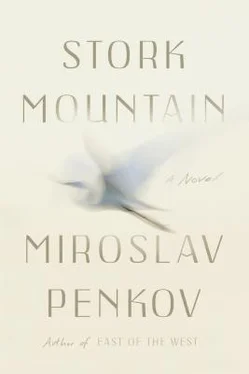Miroslav Penkov - Stork Mountain
Здесь есть возможность читать онлайн «Miroslav Penkov - Stork Mountain» весь текст электронной книги совершенно бесплатно (целиком полную версию без сокращений). В некоторых случаях можно слушать аудио, скачать через торрент в формате fb2 и присутствует краткое содержание. Год выпуска: 2016, Издательство: Farrar, Straus and Giroux, Жанр: Современная проза, на английском языке. Описание произведения, (предисловие) а так же отзывы посетителей доступны на портале библиотеки ЛибКат.
- Название:Stork Mountain
- Автор:
- Издательство:Farrar, Straus and Giroux
- Жанр:
- Год:2016
- ISBN:нет данных
- Рейтинг книги:4 / 5. Голосов: 1
-
Избранное:Добавить в избранное
- Отзывы:
-
Ваша оценка:
- 80
- 1
- 2
- 3
- 4
- 5
Stork Mountain: краткое содержание, описание и аннотация
Предлагаем к чтению аннотацию, описание, краткое содержание или предисловие (зависит от того, что написал сам автор книги «Stork Mountain»). Если вы не нашли необходимую информацию о книге — напишите в комментариях, мы постараемся отыскать её.
Stork Mountain — читать онлайн бесплатно полную книгу (весь текст) целиком
Ниже представлен текст книги, разбитый по страницам. Система сохранения места последней прочитанной страницы, позволяет с удобством читать онлайн бесплатно книгу «Stork Mountain», без необходимости каждый раз заново искать на чём Вы остановились. Поставьте закладку, и сможете в любой момент перейти на страницу, на которой закончили чтение.
Интервал:
Закладка:
I held my hand up so Elif could see it, and without words, she passed me the cigarette. How I had not realized it was a joint they were sharing, I’m still not certain. I took a deep toke and held the smoke in so it could burn me and soon my head was a bit lighter. Unlucky people, I thought, and passed the joint back. To be born here. Our balkans were fire dancers, rising from ashes to flames back to ashes. And of all the seas in the world, it was ours that was the black one. Yes, yes, I said, and took another puff when Elif offered. It was the sea I felt now, ahead in the night through which we journeyed. It was the sea that had spoken to me, like a woman in mourning, and I could not bear to hear all she was saying.
“Aysha,” I said, “turn up the music.”
She turned the volume all the way up and I took one last drag before I rolled down the window. Cool night tangled around us like waves of seaweed. The road lifted us up a small hill, down, up another. And when we’d climbed a high point, when I could lick salt on my lips, Aysha gave out a stunned cry and slammed the horn as hard as she could slam it. Where I’d heard a woman in mourning, she had seen the sea for the first time.
ELEVEN
THE ROAD was two deep ruts now with dry grass waving between them. The oaks had given way to shorter trees, which in turn had morphed into tall bushes. Branches scratched the bus and lashed the windshield and so I had rolled up the window. And just when I was thinking that we were running a fool’s errand, that we had come to a place with nothing but thicket, a pair of brake lights flashed ahead in the darkness. In no time we overtook a row of cars parked in the bushes and then people hiking in a thin file.
“Road gets mad from here on, bro,” a young guy told me when I rolled down the window. “But you’re on a bus, you know. It’s like, what do you even care?” Then he glued himself to the door, stood on his tiptoes, and, sniffing the air, tried to peek in. “Bro,” he said, “you got room for one more?”
“Why was his hair green?” Aysha asked once we were back in motion.
“And why are they all blowing whistles?” Elif added, because really it was whistles that sounded behind us. “Bro,” she said, and burst out laughing.
Next we overtook a group of pensioners with backpacks and then more kids with colorful hair who hopped up the road like rabbits and brandished green, red, and blue glow sticks. Aysha punched the horn and giggled and again the night answered with a barrage of whistles. I caught myself thinking of the Strandjans who spoke like songbirds in their ancient language, of Captain Kosta, and then of Grandpa; of how hurt he’d looked to see me lie and go to bed so early.
The road had turned lunar. We crawled out of one crater and into another, up a hill in first gear. Lost in thought, I let the engine slip and stall a few times. Then the road was so narrow I was certain we’d keel over. The back tires sunk in a rut and spun a dead spin, but somehow we managed.
“Vah, vah, vah,” Baba Mina shrieked suddenly behind me. “Here, Saint Kosta. I’m coming.”
At once her shriek chased away all merriment in the air. At once, Aysha stiffened in my lap and her feet kicked a few times. “Vah, vah, vah,” she repeated, “we’re coming, Saint Kosta,” and her teeth chattered like a stork’s bill.
It was a bonfire they’d spotted on the beach in the distance — tall flames, which the wind twisted and stretched upward. This was the beach with the stone tree, the strip of land between sea and river where the nestinari should be dancing. The sky had clouded over and the sea was nothing but blackness, but there were boats in the river and that’s how I saw it. One, two, three … I counted seven boats in total, illuminated by torches and lanterns and loaded with tourists.
We drove past a few parked buses and their passengers already walking. And when there was no more road to keep on, I turned off the engine and pressed the doors open. The air, until recently so heavy with salt and seaweed, now stank of grilled meat. Drums were beating from all directions, not together, but each on its own, a chaotic commotion that the sea wind tossed like sand in handfuls.
“Don’t be afraid, Grandma,” I told Baba Mina once the crowd took us. “Hold my hand and don’t let go.” She seized me as if she were drowning, as if I were a branch to the rescue. The excess of noise and color had overwhelmed me, but her it had frightened beyond words. For an instant, a thought uncoiled — it was a mistake to bring Baba Mina, a mistake to come here. But before I could really think it, the thought had flown by and into the sea of people.
“Elif,” I called. “Stay closer!” And her hand burned mine when she caught me.
“I’m this close to panic,” she cried, then she called for her mother to keep hold of Aysha. “Was that my father I just saw or is it the weed talking?”
Voices mixed and swept us up in a deluge — Russian, German, English. Antonio , someone was yelling to one side. Bystro , someone else was crying. A hand brushed my shoulder and I jumped, startled, but it wasn’t the imam, just some French kid looking for something. My heart was racing, my chest constricted like it was wrapped around with duct tape. And from the heat of the bodies my mind misted. I thought I was seeing a caravan of riders, flowing down a dune in the distance, each holding a bright flame; riders like the ones I’d seen painted on the walls of Elif’s house. Then lightning flashed in my eyes and when I blinked away the blindness I found myself not ten feet from a giant camel. On the camel, flooded with more light, a woman in a bathing suit was posing for pictures.
“Elif!” I cried. “Grandma!”
Somehow I’d lost them. I scurried from one face to another, bumping into strangers. A few times I plopped nose-down in the sand — large grains, more grayish and dirty-looking than actually black. My shoes and socks filled up quickly and with each step the sand scratched and burned me. By now the caravan of riders had gotten closer and really it was men on horses, Russian soldiers — no, tourists … Whistles sounded and drums were beating. I ran this way and that until at last the beach widened and the crowd spread out and it was then that I saw it. Awash with light from the bonfire, thin in its trunk, wide in its crown, as tall as a horse and its rider: the stone tree. And Elif and the others, by the fire, watching in silence.
“All it’s missing are the stork nests,” she told me once I joined them.
And the skulls in the branches, I wanted to say, but didn’t. Baba Mina had caught me by the waist and held me tightly.
“It’s all right, Grandma,” I said softly, but I’m not sure she heard me. She stared into the fire, and I knew she could see something in it I couldn’t. She saw herself as she had been — young and pretty. At her feet, back then, not just glowing embers but the entire world. Back then she could trample the embers and they wouldn’t burn her. She could trample the world and the world yielded. Go ahead, my girl, the world told her, trample me, kick me. You’re young and pretty, your whole life is before you. Why should I stop you?
The fire burned and Baba Mina held me and much the same way, Aysha hugged her mother, and much the same way the two watched the flames grow shorter. What did the flames show them, I wondered. What did they show me?
Elif, right beside us. Every strand of her short hair radiant, orange. Her face aglow. Her eyes blazing. Not watching the fire, but watching me and seeing, now for the first time, that I too was courageous and daring, a real rebel.
By now, my lips were chapped and swollen; my stomach was hurting with hunger. I had seen a vendor at some point, selling grilled meats, and I imagined how sweet a kebabche would taste right at this moment. Slowly the fire died down before us and embers blinked open like red eyes. Then out of the darkness three young men stepped forward. They were dressed in traditional costumes — white shirts, black trousers, red sashes — and after they’d lit a line of torches in the sand they began to spread the embers in a circle with long rakes. Each time the rakes smashed a piece of charred wood to smaller pieces, sparks flew up and the wind whirled them in thick swarms.
Читать дальшеИнтервал:
Закладка:
Похожие книги на «Stork Mountain»
Представляем Вашему вниманию похожие книги на «Stork Mountain» списком для выбора. Мы отобрали схожую по названию и смыслу литературу в надежде предоставить читателям больше вариантов отыскать новые, интересные, ещё непрочитанные произведения.
Обсуждение, отзывы о книге «Stork Mountain» и просто собственные мнения читателей. Оставьте ваши комментарии, напишите, что Вы думаете о произведении, его смысле или главных героях. Укажите что конкретно понравилось, а что нет, и почему Вы так считаете.











